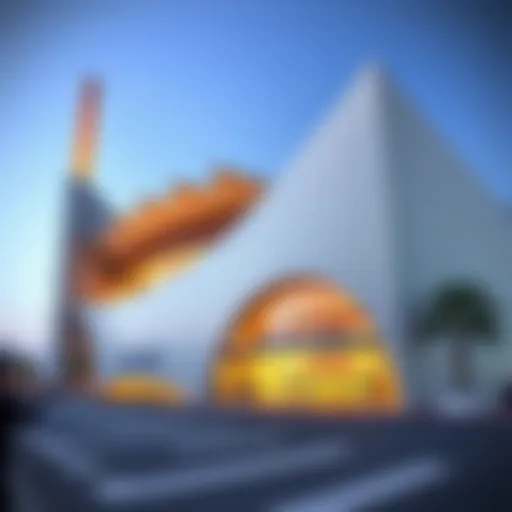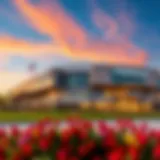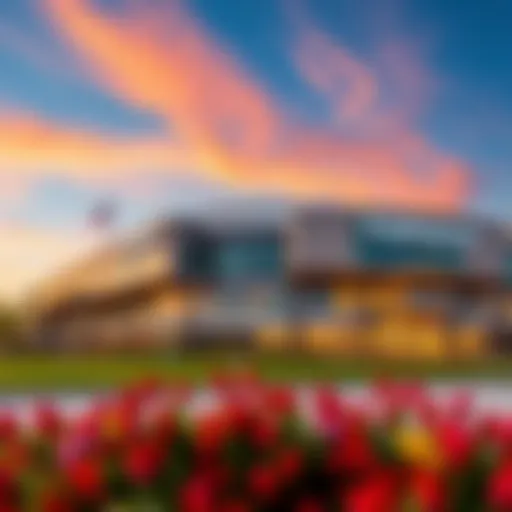Explore the Renowned Markets of Dubai
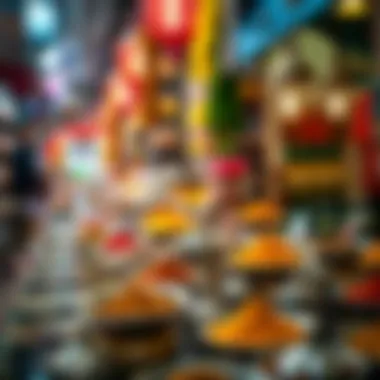

Intro
Dubai is a city where tradition meets modernity, creating a rich tapestry of cultures, offerings, and experiences. Among its many attractions, the markets stand out as essential elements that define the essence of this vibrant metropolis. From the bustling alleys of the traditional souks to the glittering expanse of modern malls, each market tells a unique story that adds to the city’s allure. This exploration delves into the renowned markets of Dubai, shedding light on their individual features and cultural significance while also considering their impact on the local economy.
Whether you're a property enthusiast, an investor, or someone who simply enjoys the lifestyle that comes with living in or visiting Dubai, understanding these marketplaces will provide valuable insights into the real estate sector and beyond.
Market Trends and Insights
Current Trends in Dubai Real Estate
As the sun sets on the skyline of Dubai, its markets buzz with life. In recent years, the real estate landscape has undergone significant shifts, reflecting broader global trends while also catering to the unique aspects of Dubai's culture. The Arabian Desert may seem ageing at points, yet new developments bloom continuously like palm trees in the dunes. For instance, luxury properties flaunt modern amenities, catering to a clientele that desires both comfort and extravagance. Also, mid-range projects attract both locals and expats, ensuring inclusivity.
Consumers today are not merely looking for space to live; they are seeking lifestyles intertwined with retail, entertainment, and communal experiences.
Predictions for Future Market Developments
Looking ahead, market analysts anticipate even greater integration of technology in the marketplace. Increasingly, smart homes and digital transactions are expected to dominate. The response to the challenges posed by the pandemic has accelerated these trends. Homes equipped with the latest technology that allows for better energy efficiency are on the rise. As noted in a report by the Dubai Land Department, smart technologies in properties will become the norm, enhancing not only functionality but also the overall living experience.
"The evolution of marketplace trends in Dubai isn’t just a phase; it’s a metamorphosis that reflects our ever-changing society."
One cannot underestimate the role of sustainability in future developments. With global discourse on the environment becoming more prevalent, properties that prioritize green initiatives will likely command higher interest and value.
Luxury Developments and Properties
Spotlight on Iconic Developments
Dubai is home to iconic developments such as Burj Khalifa and Palm Jumeirah, yet it does not stop there. Properties like the Bulgari Resort and the Dubai Creek Tower signify the heights of luxury and innovation that developers are eager to reach. Each property showcases bespoke design, reflecting a mix of international influences and Arabian aesthetics. These developments not only shift the skyline but also redefine the living experience.
Investing in Luxury Properties: A Guide
Investing in luxury properties in Dubai can yield fruitful returns when considering key factors. Potential investors should keep an eye on location, as proximity to markets and amenities can greatly enhance property value. Investors might also want to consider upcoming neighborhoods that are being developed and show promise. Consulting with local realtors can provide valuable insights tailored to specific preferences.
Furthermore, understanding the legal landscape is crucial. Foreign investors must navigate through regulations governing property ownership in a rapidly evolving market. Relying on trusted resources tostay informed, like Dubai Land Department can help navigate these complexities.
A diversified portfolio comprising both residential and commercial properties can better mitigate risks amidst fluctuating market conditions. The vibrant economic canvas of Dubai offers numerous possibilities, inviting investors to step into a world of opportunities that meld lifestyle with luxury.
End
Dubai's markets symbolize more than just commercial transactions; they represent a connection to the ever-evolving narrative of the city's past, present, and future. As these markets grow and adapt, they will continue to play pivotal roles in shaping the economic landscape, offering an alluring blend of tradition and modernity that caters to the eclectic mix of residents and visitors.
Historical Context of Markets in Dubai
Understanding the historical context of markets in Dubai reveals the intricate tapestry of trade, culture, and growth that defines this magnificent city. From its humble beginnings, Dubai has morphed into a bustling metropolis where both tradition and modernity coexist. Exploring these origins provides depth to the narrative of how markets evolved, adapting to changes in society and technology while retaining their core essence.
Origins of Dubai's Trading Markets
Dubai's roots as a trading hub can be traced back to the early 19th century. The region served as a point for maritime trade routes, conveniently positioned between Europe and the Indian subcontinent. Traditional marketplaces, or 'souks,' blossomed from this advantageous geography. Merchants from different backgrounds brought their wares, creating a vibrant atmosphere filled with diverse goods ranging from textiles and spices to precious metals.
A Blend of Cultures
Dubai’s trading markets were not just commercial spaces; they were melting pots of cultures. The historical significance lies in their role as meeting points, where traders exchanged not just goods but also ideas and traditions. For example, the Spice Souk was notorious for its strong scents, reflecting influences from various societies. As a result, listeners could hear a symphony of languages, merging the local dialects with those of traders from afar. This cultural mix enriched the identity of Dubai, laying the groundwork for its future as a global city.
Evolution to Modern Shopping Experiences
As Dubai grew, so did its markets. The metamorphosis from traditional souks to modern shopping experiences represents a significant chapter in its economic development. The mid-20th century marked a shift, as the discovery of oil transformed Dubai into a financial powerhouse. While the old markets retained their charm, the need for larger commercial spaces became apparent.
From Tradition to Modernity
Modern shopping malls began sprouting, incorporating architectural flair and a variety of retail offerings. For example, the Mall of the Emirates, launched in 2005, is not just a market; it's an experience, complete with skiing slopes and luxurious brands. Such malls cater to local shoppers and tourists alike, showcasing high-end goods amidst sprawling spaces that seamlessly blend shopping and leisure.
Dubai now stands as a juxtaposition of the ancient and the contemporary; traditional souks alongside modern retail giants illustrate the continual adaptation of the marketplace. This transition signifies not just a change in shopping habits but also reflects a dynamic economy that is responsive to both historic significance and modern demands.
In summary, the historical context of markets in Dubai illuminates the city’s path from a small trading post to a leading global metropolis, showcasing an evolution that respects its roots while embracing innovative growth.
Souks: The Traditional Heart of Dubai
Dubai's markets, known locally as souks, serve as a vibrant reminder of the city’s rich history and cultural heritage. These traditional marketplaces are not just places for buying and selling; they embody social interactions, craftsmanship, and the essence of Dubai's identity. The allure of these souks lies in their ability to transport visitors back in time while blending seamlessly with the modernity that characterizes the city today.
The souks are especially significant as they present a microcosm of the city's diverse culture, drawing in locals and tourists alike. Each souk has its own unique flavor and atmosphere, making it a must-visit for anyone wanting to experience authentic Dubai. They highlight the traditional occupations that have flourished here and the continuing legacy of artisanal craftsmanship.


The Gold Souk: A Glittering Haven
The Gold Souk stands out as one of the most illustrious landmarks of Dubai. Gleaming displays of intricate gold jewelry entice passersby and hint at the wealth and prosperity associated with this precious metal.
Variety of Jewelry
The Gold Souk is renowned for its vast selection of jewelry. From intricate traditional pieces to contemporary styles, there’s something for everyone. You can find everything from stunning gold necklaces to delicate bracelets, often set with precious stones. This variety appeals to both locals and visitors; it allows them to find unique items that resonate with personal taste and budget.
Many are drawn to the custom-made pieces, crafted by skilled artisans who work on-site. This personal touch adds an element of exclusivity to one’s purchase, underscoring the significance of craftsmanship in the market.
Pricing and Negotiation
Pricing in the Gold Souk is not as straightforward as it may seem. The market encourages negotiation, which is embedded in the buying culture here. Visitors can haggle and ultimately arrive at a price that suits both parties. This practice not only makes the shopping experience more engaging but also provides customers a sense of empowerment during their purchase.
However, it’s wise to have a baseline knowledge of gold prices to ensure that a deal is fair and advantageous.
Tourist Attractions
Besides being a shopping hub, the Gold Souk is a prominent tourist attraction, often featured in travel itineraries. Its breathtaking displays and the bustling atmosphere create a captivating experience. Visitors can immerse themselves in the local culture, observe the art of jewelry making, or simply enjoy the dazzling sights of gold shimmering under the market lights.
The Gold Souk presents an opportunity to capture stunning photographs, making it a haven for travel enthusiasts.
The Spice Souk: A Sensory Experience
Just a stone’s throw away lies the Spice Souk, a sensory delight that awakens the senses. Rich aromas waft through the air, beckoning visitors to explore the myriad of spices offered.
Types of Spices Available
The variety of spices available in the Spice Souk is impressive. You can find everything from saffron to za’atar, and turmeric to cardamom, showcasing the region's culinary diversity. These spices are not just integral to Middle Eastern cuisine but are also known for their health benefits, making them a valuable addition to every kitchen.
Visitors often leave with not only a wealth of knowledge but their shopping bags filled with ingredients that might inspire their next culinary endeavor.
Culinary Significance
The culinary significance of spices goes beyond taste; they represent the rich intercultural connections fostered through trade. Each spice tells a story, whether it’s the saffron harvested from the high-altitude deserts of Iran or the aromatic cumin that flavors countless dishes. For food enthusiasts and home chefs, this souk serves as a treasure trove of exotic flavors and cooking inspiration.
However, navigating through the options can be overwhelming. It helps to have some prior knowledge or a local guide to navigate the selection effectively.
Visitor Experiences
Visitors to the Spice Souk often comment on the immersive experience, where engaging with vendors leads to learning about the history and uses of the spices. These conversations frequently enhance the shopping experience, as many vendors take pride in sharing family recipes or cooking tips. This intimate interaction creates lasting memories beyond the physical items purchased.
Textile Souk: A Vibrant Market
The Textile Souk presents a vibrant tableau of colors and textures, making it a delightful stop for anyone interested in fabrics. The energy in this market is palpable, with merchants eagerly beckoning customers to explore their goods.
Fabrics from Around the World
The souk features an impressive range of fabrics imported from various regions, including silks from India, cotton from Egypt, and brocades from Iran. Each cut of fabric carries a story of its origin, and passionate tailors and craftsmen await to help customers find the perfect material. This diversity highlights Dubai's global trade connections and cultural exchanges.
Such an assortment not only caters to different tastes but also encourages creativity in fashion and home decor.
Tailoring Services
A standout feature of the Textile Souk is the availability of tailoring services. Many shops offer customers the chance to design their own clothing. Tailors work closely with clients, ensuring that each piece fits perfectly and reflects personal style. This bespoke service is not only a practical choice but also meaningful, as customers leave with an item unique to them.
While the process may take some time, the results often far exceed expectations, creating cherished garments for years to come.
Fashion Trends
Fashion trends continuously evolve, and the Textile Souk remains a barometer for what’s hot in the industry. Vendors are astutely aware of global shifts in style and stock their fabric selections accordingly. This responsiveness keeps the market feeling fresh and forward-looking.
For those interested in the latest trends, wandering through the textile stalls can ignite inspiration for both professional and personal projects. Yet, keeping up with trends can be challenging, and local guidance may enhance the shopping experience.
"The soul of Dubai's markets lies not just in the goods traded, but in the stories woven through fabric, spice, and gold – a tapestry reflecting the city’s heart.
Modern Shopping Malls: Where Luxury Meets Convenience
The allure of modern shopping malls in Dubai goes beyond mere commerce; these venues serve as social hubs and architectural marvels, blending the essence of luxury with everyday convenience. As we delve into the vibrant world of shopping malls, it’s essential to understand how they shape not just consumer culture but also influence the local economy and lifestyle. Clusters of designer boutiques, gourmet dining, and entertainment facilities create a unique shopping experience that draws both locals and tourists alike.
Mall of the Emirates: An Iconic Landmark
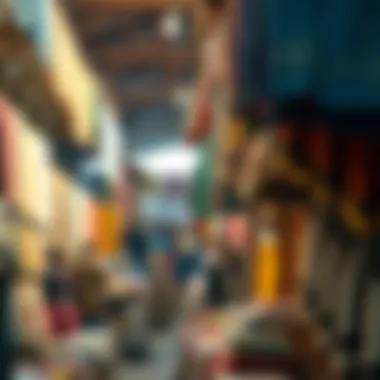

The Mall of the Emirates stands tall as a symbol of Dubai’s rapid growth and innovation in retail.
Shopping Highlights
One of the defining features of the Mall of the Emirates is its extensive range of shopping options. Housing over 600 retail outlets, it encompasses everything from high-street brands to luxury labels. For anyone looking to explore diverse shopping experiences, this mall serves as a veritable treasure trove. Notably, the ability to find independent local boutiques alongside international brands makes it a valuable resource for those seeking something distinctive. Though the prices may vary, the array of options available allows visitors to find what they seek without having to compromise. The key characteristic here is choice, which greatly benefits shoppers wanting variety in their purchases.
Dining Options
Dining at the Mall of the Emirates is nothing short of a gastronomic adventure. With more than 90 restaurants, cafes, and eateries, the culinary landscape ranges from quick bites to fine dining experiences. A highlight is the renowned "Ski Chalet" that gives diners a unique experience while they enjoy their meals. By catering to diverse palates, this mall not only addresses the hunger of shoppers but also provides a chance to sample flavors from around the world, making it a popular choice for many. While some might find prices on the higher side, the quality of food and ambiance typically justifies the expense.
Entertainment Facilities
In addition to retail and dining, entertainment facilities at the Mall of the Emirates are extensive, enhancing the overall appeal for families and groups. With features such as an indoor ski resort and a state-of-the-art cinema, there's something for everyone here. This adds an extra layer of attraction, ensuring that shopping is not the only experience visitors are after. The unique feature of indoor skiing in a desert city offers a compelling draw, making the mall a distinctive destination. Nevertheless, heavy foot traffic can occasionally make certain experiences less enjoyable during peak times, yet the facilities generally impress.
Dubai Mall: The Epitome of Luxury
Dubai Mall is often referred to as the pinnacle of luxury shopping and offers a slightly different atmosphere compared to its counterpart.
Attractions Within the Mall
Among the many enticing attractions, the Dubai Aquarium and Underwater Zoo ranks highly. Visitors are often mesmerized by the extensive marine life displayed. This stunning feature serves to enhance the mall's overall appeal, drawing in tourists who might not just be interested in shopping. While some might argue that the focal point should remain on shopping, having such attractions makes the mall a top choice for a broader audience. However, during busy seasons, the crowd can diminish the tranquility that one might seek while enjoying the exhibits.
Luxury Brands Available
Flaunting an unparalleled selection of over 1,200 retail outlets, Dubai Mall showcases numerous luxury brands such as Gucci, Louis Vuitton, and Burberry. This makes it an unmissable stop for high-end shoppers. For those interested in the luxury market, the presence of these brands signifies the upscale nature of Dubai. While shoppers can easily find desired items, the prices attached may not be suitable for everyone, especially casual shoppers. However, the ambience and service at these luxury stores tend to reflect the high costs associated with shopping here, thus enhancing the overall experience.
Visitor Statistics
As for visitor statistics, Dubai Mall attracts a staggering 80 million visitors annually. That numbers to nearly 22,000 people visiting each day, which underscores its status as one of the most popular shopping destinations in the world. This heavy foot traffic reflects not just the mall's appeal, but also its significance in Dubai's economic framework. While the influx of visitors can elevate some experiences, it may also lead to challenges such as overcrowding during peak hours, making it less pleasant for those looking for a quieter shopping experience.
Ibn Battuta Mall: A Cultural Fusion
Ibn Battuta Mall is unique in its design—a cultural landmark that takes visitors on a journey through various historical themes established by its namesake, the famed explorer.
Architectural Design Themes
The architectural design themes throughout the Ibn Battuta Mall are impressive, featuring sections inspired by cultures from Asia, Persia, Egypt, India, and Morocco. This thoughtful design enhances the shopping experience while educating visitors about different global cultures. Each section offers a distinctive ambiance that sets it apart from other malls in the region. While the vast layout can sometimes lead to confusion, once familiar, it makes for a delightful cultural exploration. The unique feature here is that the design itself plays a central role in creating an immersive experience, engaging shoppers beyond just transactional encounters, yet it might be a bit overwhelming for some first-time visitors.
Shopping and Dining Highlights
The shopping and dining highlights showcase various options that cater to diverse tastes. Visitors can find familiar fast-food chains alongside lavish dining establishments. The dynamic mix attracts families as well as solo travelers looking for both rapid meals and leisurely dining experiences. The presence of culturally-themed eateries adds to the overall delight. However, some may find noted prices vary significantly depending on the dining choice. For those who prefer casual dining, this could be a point of concern.
Cultural Events
Throughout the year, Ibn Battuta Mall regularly hosts cultural events that celebrate various traditions, festivals, and artistic performances. These events draw in crowds, creating a lively atmosphere. This is notable for contributing to community engagement and enhancing the visitor experience. The cultural events not only showcase local talents but also attract tourists seeking authentic experiences. Hence, while busy events may lead to increased foot traffic, they also enrich the cultural fabric of Dubai, making this mall a remarkable spot for visitors seeking more than just standard consumerism.
The Role of Markets in Dubai's Economy
The markets in Dubai play a pivotal role in shaping the city’s economic landscape. These marketplaces, ranging from historical souks to contemporary malls, are not mere shopping destinations but vital components that drive employment, attract tourism, and influence real estate development. This section delves into these critical elements, elucidating the profound impact markets have on the overall economy of Dubai.
Employment Opportunities Created by Markets
Markets in Dubai serve as a formidable engine for job creation across diverse sectors. When one considers the bustling atmosphere of both traditional and modern marketplaces, it becomes evident that they are rich in employment potential. Small businesses, family-run shops, and large retail chains coalesce to create a mosaic of job opportunities.
In the souks, for instance, artisans, craftsmen, and traders engage in not just selling but also showcasing their skills. This aspect of the market fosters a sense of community while generating employment. The Gold Souk alone supports hundreds of jewelers, each contributing to the local economy. Meanwhile, modern malls like the Dubai Mall host various international brands, which in turn create a wealth of positions in retail, management, and customer service.
Over 90,000 people are employed in Dubai's retail sector, a significant figure that underscores the importance of markets in employment creation.
Additionally, related sectors such as logistics, transportation, and tourism benefit as well. As tourists flock to these markets, the need for guides, drivers, and hospitality staff sees a notable uptick, further amplifying the employment landscape.
Contribution to Tourism
Dubai's markets are crucial tourism magnets that considerably boost foot traffic and attract international visitors. The allure of the Gold Souk's dazzling displays of jewelry, the intricate spices of the Spice Souk, and the vibrant atmosphere of the Textile Souk create unique experiences for tourists. Not only do these markets offer products but also a slice of the local culture that can't be replicated elsewhere.
Tourism statistics indicate a strong correlation between market visits and overall tourist spending. Visitors not only purchase goods but also engage in cultural learning and social interactions. Unique events and festivals held in these markets—like the seasonal Ramadan night markets—enhance visitor experience and draw large crowds, contributing significantly to Dubai’s diverse tourism portfolio.
Moreover, as more travelers prioritize authentic experiences, the demand for activities within these markets continues to soar. This trend compels the local government to invest in market infrastructure, thus ensuring that the charm of traditional markets is preserved while keeping them relevant for today’s tourists.
Impact on Real Estate Development
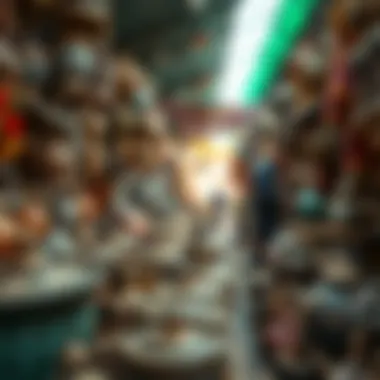

The presence of bustling markets undeniably influences real estate development in Dubai. Properties in areas proximate to prominent markets tend to retain higher values, benefiting from the localized economic activity that markets engender. This interplay of commerce and property not only enhances real estate prices but also drives new developments in the vicinity.
For instance, the regeneration of areas surrounding historical souks has led to a surge in luxury residential and commercial projects. Developers and investors are eager to capitalize on market proximity, recognizing that thriving marketplaces are essential for attracting residents and businesses alike.
Furthermore, as retail and commercial activities grow, so does demand for real estate solutions tailored to meet the needs of operational facilities and retail spaces. Innovative real estate projects that integrate traditional and modern designs are popping up, emphasizing the market's influence in shaping the urban fabric of Dubai.
Cultural Significance of Dubai's Markets
Dubai's markets carry a weight of cultural significance that extends beyond mere commerce. These bustling hubs serve not only as places to buy and sell but as foundational elements in the social fabric of the city. They act as a bridge, connecting the past with the present, while shaping the future of community interactions and cultural identities.
In examining the cultural significance of Dubai's markets, we uncover specific elements that illustrate their relevance:
- Economic Impact: Markets play an essential role in the economic landscape of Dubai, shaping opportunities for local entrepreneurs and creating job openings for residents.
- Tourism Magnet: The unique atmosphere of the traditional souks attracts millions of visitors every year, eager to experience the authentic charm of Dubai’s heritage and modern lifestyle intertwined.
- Cultural Exchange: Markets facilitate a vibrant exchange of ideas, customs, and products between diverse nationalities, reflecting the multicultural tapestry of the city and enhancing its global appeal.
As we delve into the individual components of these markets, we begin to see how they nourish social interactions and preserve rich Emirati traditions.
Social Interactions and Community Building
The communal aspect of Dubai's markets cannot be understated. When buyers and sellers come together in these vibrant spaces, they do more than conduct transactions; they forge connections that often transcend commercial interests.
In a place like the Gold Souk or Spice Souk, patrons are not merely there for shopping. The act of negotiating, sharing stories, and bartering invokes a sense of belonging and shared experience. This interaction fosters a close-knit environment, helping to solidify community ties among Dubai’s diverse populace. It's typical to spot groups of friends huddled around stalls, sharing laughs, or families wandering through the colorful displays of spices, textiles, and jewelry. Such scenes are indicative of a thriving culture, where personal relationships underpin market dynamics.
Moreover, markets serve as venues for social events that promote cultural traditions and celebrations. For instance, during Ramadan, evenings at the souks are filled with families enjoying the festive atmosphere, sampling delicacies, and participating in local events. These markets transform into community gathering spots, showcasing how they bring people together.
Preservation of Emirati Traditions
Dubai's markets are echo chambers of Emirati heritage, preserving traditions that might otherwise fade in the rush of rapid modernity. When you enter a souk, the sights, smells, and sounds evoke the essence of a bygone era, where trade was not just about items exchanged but also about cultural narratives shared.
Take the Spice Souk; it offers a glimpse into how trade routes once operated, presenting an array of spices that tell stories of regional flavors and culinary history. Each item for sale—be it saffron, cardamom, or dried fruits—serves as a reminder of the cultural exchange that has enriched Emirati dishes over the centuries.
Similarly, the Textile Souk showcases artisanal skills that have been passed down through generations. Vendors display handcrafted fabrics and traditional garments, emphasizing the importance of craftsmanship in preserving local identities. Visitors often find themselves engaged in conversations about the origins of particular textiles, further deepening their understanding of UAE culture.
In sum, the cultural significance of Dubai's markets cannot be isolated to their economic contributions. They are vibrant spaces where community bonds are formed and traditions are kept alive, preserving the very essence of what it means to be a part of Dubai's dynamic landscape.
Navigating the Markets: A Practical Guide
Navigating the diverse markets in Dubai can be an exhilarating experience, rich in sensory overload and cultural accents. For many, it’s not just about shopping; it’s about discovering the weaving stories each market has to tell. This guide serves as an essential tool for visitors, especially those embarking on their first exploration of these bustling enclaves. In understanding the nuances of these marketplaces, one cultivates a deeper appreciation for the very essence of Dubai.
Tips for First-Time Visitors
As they say, the first step is always the hardest. For first-timers, Dubai’s markets can sometimes feel overwhelming. However, with a few preparatory tips, one can easily transition from feeling lost to savouring every moment. Here are some pointers:
- Dress Comfortably: Considering the climate, wearing light, breathable fabric is key. A good pair of comfortable shoes will make navigating the cobblestone or tiled pathways hassle-free.
- Timing Matters: Mornings and late evenings tend to be cooler and less crowded. For those not fond of crowds, this can significantly enhance the shopping experience.
- Stay Hydrated: The heat can sneak up on you. Always have a bottle of water handy, especially when exploring the outdoor souks.
- Engage the Vendors: Don't be shy about striking up conversations. Many vendors are keen to share insights about their products, and this adds richness to your visit.
- Know Your Bargaining Strategy: Haggling isn’t just accepted—it’s expected in many markets. Approaching negotiations with a friendly, relaxed demeanor can lead to better deals.
These simple tips will not only boost your confidence but also enhance your experience in Dubai’s vibrant markets.
Understanding Market Etiquette
Navigating through the pulsating energy of Dubai’s markets also means learning the unspoken rules that govern vendor-customer interactions. Understanding market etiquette will not only help you blend in but also ensure interactions are smooth and enjoyable. Here are a few key considerations:
- Respect Local Customs: Being aware of cultural norms, such as greetings or appropriate dress, demonstrates respect and can foster goodwill. A smile and a simple ‘marhaba’ (hello) can go a long way.
- Asking Permission: Before taking photos, especially of products or people, asking for permission is polite. Some vendors may be wary, while others might happily pose.
- Be Mindful of Negotiation Tactics: While bargaining is encouraged, it’s important to remain courteous. If a price feels right, sometimes it’s best to accept it. It’s not just about the money; it’s about mutual respect.
- Consider Buying Local Products: Supporting local artisans and their crafts not only benefits the economy but also helps preserve cultural heritage. Your purchase tells a story!
- Enjoy the Atmosphere: Finally, immerse yourself in the surroundings. The sights, sounds, and aromas of markets reflect Dubai’s rich cultural tapestry. Embrace it!
A deeper understanding of these nuances allows for a richer market experience, turning a simple shopping trip into an expedition through history, culture, and community. By navigating with purpose and respect, visitors can cherish the unique essence Dubai’s markets encapsulate.
The Future of Markets in Dubai
As Dubai continues its evolution as a global hub for commerce and tourism, the marketplace is set to undergo significant transformations. The future of markets in this vibrant city is not just about retail; it embraces a blend of cultural identity, technological advancements, and sustainable practices that cater to an increasingly discerning audience, including investors, homebuyers, and expats. This section explores key trends shaping the marketplace and highlights sustainability initiatives that aim to redefine the shopping experience, ensuring it aligns with dynamic lifestyle expectations and ecological responsibility.
Trends Shaping the Marketplace
In a bustling environment like Dubai, markets are adapting to cater to varied consumer preferences and expectations. Several noteworthy trends are emerging:
- Integration of Technology: Markets in Dubai are increasingly becoming technologically advanced. Augmented reality and virtual try-on spaces are gaining popularity in retail therapy. Shoppers can visualize décor or clothing in their own space before making a purchase.
- Experience Over Products: Future markets emphasize lifestyle experiences rather than mere transactions. Pop-up events, interactive installations, and cultural showcases are becoming part of the market ambiance. This makes shopping more about enjoying the journey and less about the end result.
- Digital Payment Solutions: The rise of e-wallets and contactless payment systems is shaping how transactions occur. They're faster, more convenient, and in tune with the fast-paced life of Dubai’s residents. This shift is resulting in less cash being dealt with and improving the overall consumer experience.
- Personalized Shopping: Data analytics play a prominent role in creating a tailored shopping experience. As businesses gather data regarding consumer habits, they curate shopping experiences that resonate with individual preferences.
These trends are creating a marketplace that is not just about commerce, but also involves creating connections and a sense of belonging among its visitors.
Sustainability Initiatives in Markets
As environmental consciousness heightens globally, Dubai’s markets are not lagging. Sustainability initiatives are being integrated across various dimensions of marketplace operations, embodying eco-friendly practices:
- Waste Reduction: Initiatives aimed at minimizing waste are increasingly prioritized. Many market vendors now engage in recycling programs and zero-waste strategies, focusing on reusable packaging and sustainable products.
- Local Sourcing: To support community and reduce carbon footprints, markets are pursuing partnerships with local farms and artisans. This not only strengthens the local economy but also promotes organic and fresh produce, appealing to health-conscious consumers.
- Energy-Efficient Infrastructure: Many new market constructions are designed with energy-efficient technologies in mind. Solar panels, energy-efficient lighting, and smart climate control systems are integrated into these spaces, demonstrating a commitment to reducing environmental impact.
"Sustainability is not just an initiative; it is essential for longevity in markets. It resonates with the modern consumer who values ethical and responsible practices alongside their shopping experiences."
- Eco-Friendly Initiatives: From introducing recyclable materials to banning single-use plastics, many markets are actively committing to sustainability goals. Educational workshops are also becoming popular, helping shoppers understand their role in supporting ecological efforts.
The interconnected nature of these trends and initiatives indicates a strong future for Dubai's markets. As they evolve, the symbiosis between cultural significance, lifestyle preferences, and ecological responsibility will define their character, impacting not only the local economy but also the global market dynamics.



